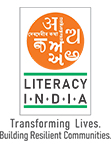


Shiksharth / Jagrukta
Using art for holistic development
Encouraging self-expression through creativity is intrinsic to Literacy India’s focus on holistic development. Combining learning and creativity, project Shiksharth exposes children from underprivileged backgrounds to different forms of art and helps identify and hone their individual talent.Theatre workshops are part of the curricula for children aged 8 to 13 years and provide a safe learning environment. Dramatics and performing arts help develop their perception and facilitate thinking and the ability to express.
Hands-on learning in Science classes through experiments, project work and models is also a part of the process. It has been observed that children who underperform in theory classes tend to show keen interest during practical classes and projects from real-life, such as ascertaining how an ATM, a guitar, or a toffee vending machine work.
Interactive sessions on Value Education are also conducted every month through stories and class discussions on themes such as patriotism, maintaining one’s health and hygiene, being compassionate and the importance of conservation of our environment. Children are also encouraged to share anecdotes, news clippings, and teachings of great personalities on the theme of the month.
Highlights of 2019-20
- Supported by Oracle India and facilitated by CAF India, the students of Shiksharth staged a drama and dance programme that addressed social issues and some pressing concerns being faced by the country.
- Teachers organised an awareness campaign at Bajghera village to enlighten students about the importance of voting using visual aids like charts, posters, and slogans.
- Students of the theatre programme also visited Mullahera village, Carterpuri village, Dharam Colony, Gupta Colony and Shankar Vihar to stage skits on ‘Say no to plastic’, use of renewable energy, harms of open defecation and similar themes with social repercussions.
- Teachers used innovative methodology like real life data collection and analysis to make concepts like statistics easy.
- Awareness campaign on cleanliness and hygiene ‘Cleanliness is next to Godliness’ was organised. Students were also asked to work on a hygiene project to spread awareness on the importance of staying clean.
- Students designed and developed a rotating wheel game and a game of flash cards. They also made 3D models of heritage buildings.
- To explain the concept of waste management, students developed innovative items out of waste material, which were presented later.
- Innovative methodologies like a skit to teach the rule of BODMAS, ‘hand rule’ to explain Trigonometry and visual presentation on Vedic mathematics to help children calculate faster were used during Maths week to explain concepts.
- During Social Science week, a Power Point presentation to explain how a government functions, a mock parliament session and a skit on fundamental rights were organised.
- Students prepared a play named ‘Plastic Ek Abhishaap’ to spread awareness on the harmful effects of plastic.
- To address the issue of open defecation, students staged ‘Padhe Likhe Anpadh’.
